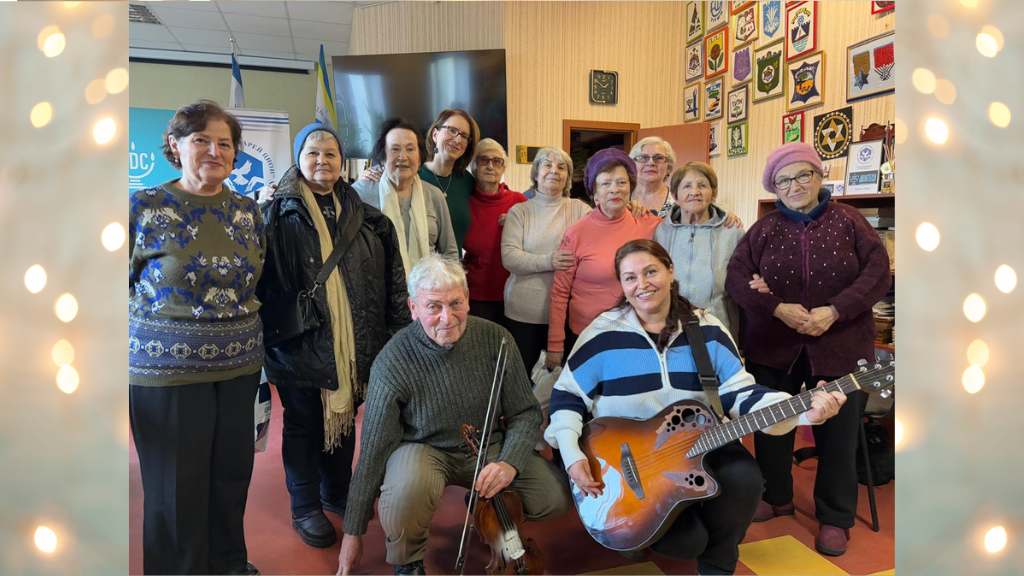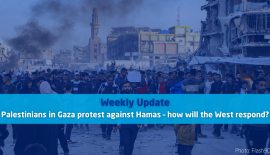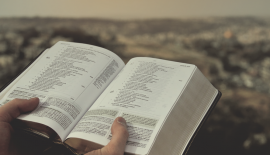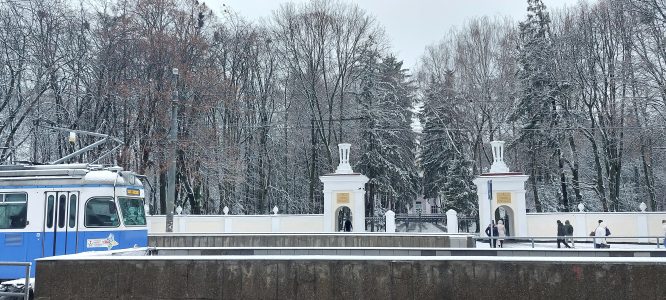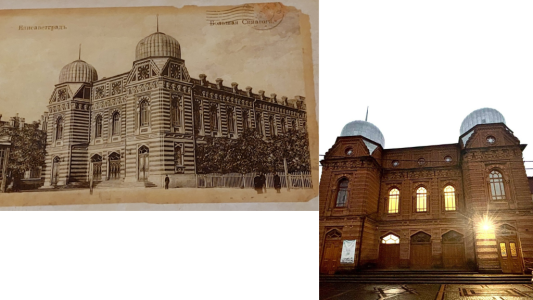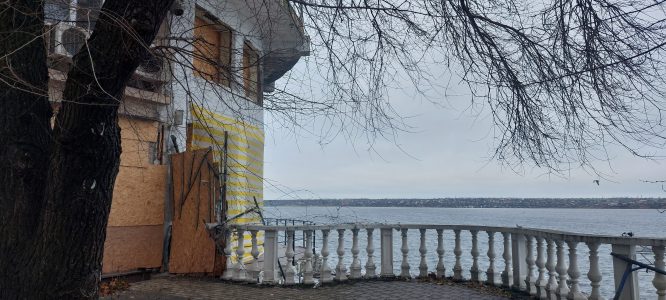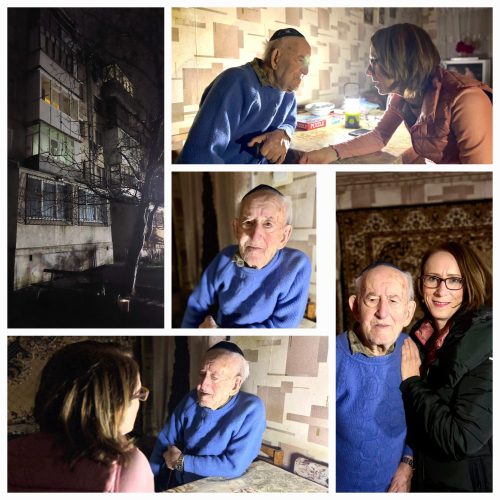Hanukkah miracles in Ukraine today
December is not really the season to visit the needy in Ukraine. The weather conditions are limiting mobility, and the power cuts are becoming more frequent. And yet we decided to go on a Hanukkah tour especially now. When, if not now, should we bring light into the darkness?
Kirovograd – get-together in the historic but cold synagogue
The Jewish community in Kirovograd, now called Kropivnitsky, is one of the few fortunate ones to have regained its synagogue building after the collapse of the Soviet Union and was able to make it usable again with considerable investment.
The temperature in the synagogue’s meeting room, scarcely heated with some pitifully ineffective radiators, is so low that one can barely endure it wearing a jacket and hat. Hardly any of the Jewish senior citizens leave the house anymore, let alone in winter. But today no chair remains empty. It’s a special day for everyone.
Unfortunately, a two-hour power cut has been announced for the very start of our joint meal – which means even more cold, darkness and cold food. We start anyway.
The failed power failure
“I’m all alone now,” says Natalia. “But here I feel like a little girl again. Here, I have a family again, and that’s thanks to you!”
Mr. Shnayderman comes up to us and wants to express his appreciation in person. “It’s not an easy time for us here,” he says. “The air alert is constantly going off and we have to go into the basement. It’s a bit like back then, in World War II. I hid with my mother and my brother; we didn’t manage to escape. We went from one hiding place to another in the surrounding area. That’s how we survived. The fact that you think of us – that is incredibly precious for us!”
At 2 p.m. Rabbi Dan looks at his watch, then at 2.10 p.m. and 2.15 p.m. The radiators, the hobs and the lights are still on. As everyone heads home again, we realize that the power failure has failed!
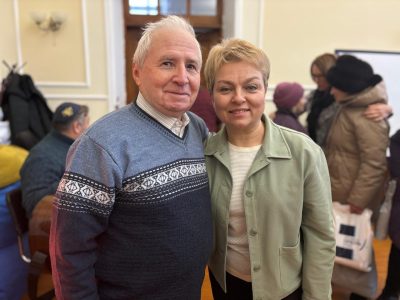
Mr. Shnayderman re-lives the war years of his childhood. He is incredibly thankful for the encouragement brought by our team.
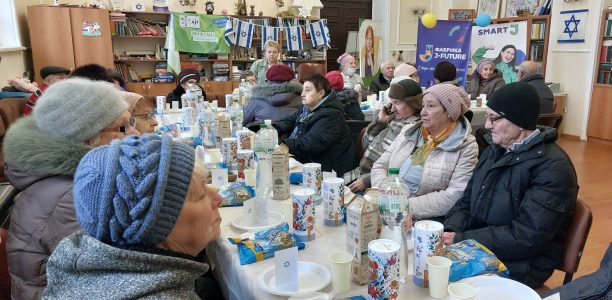
Our joint luncheon at the historic Kirovograd synagogue warms hearts and souls. The announced power cut never happens.
Nikolayev – only 50 km to the front line
In the meantime, we have checked in at our Nikolayev hotel in the South. Within 24 hours, we have traveled a good 800 kilometers on Moldavian and Ukrainian country roads. Here, too, we have invited all the seniors we support through the Jewish community and who are still mobile enough, to a festive lunch at the synagogue. For those bound to their homes, we visit them later – as many as fit in our schedule. Our minibus is filled with small gifts to the roof – we even found some stollen at Metro in Vinnitsa!
We are staying in the hotel rooms which are newly renovated. The other side of the building, which is located directly on the Dnieper, is still being restored. From the outside, you can see the wing that was badly damaged in one of the many rocket attacks.
We start into an incredibly gray day. We have long since left the snow behind us. It’s probably gray here at this time of year even without the war, but even more so now. Electricity is being saved; you only see a few younger people on the streets. Many houses have sealed the window hatches with chipboard.
Festive luncheon surrounded by holy books
I had been saving Nikolayev for better times until now. From here it is only 50 kilometers to the frontline in Kherson, where death falls from the sky every day. But we experience the extraordinary grace of God especially in this city – during the 48 hours we spend here, it is quiet except for one air raid in the morning. We can recharge our batteries at night and bring hope and joy into the homes during the day without hindrance.
The view into the prayer room of the synagogue is stunning. In Hebrew thinking, spiritual service is not separated from communion over a meal. For all the rules that need to be observed, it is perfectly compatible to set up tables and load them with food while the holy books are on the shelves all around.
Rabbi Gottlieb welcomes us warmly and our festive meal can begin, accompanied by music from two music students. I am back in Nikolayev for the first time in more than three years. Rosalia pulls me into the seat next to her. “I’m so happy to see you again! I’m in tears, I can’t help it. Do you remember how we saw each other in Odessa last year when my husband and I fled there? You did so much for us. I will never forget that!”
As soon as we finish our festive and delicious get-together, it is dark out of a sudden. Now the city is even darker. All the more important to bring light into the houses right now.
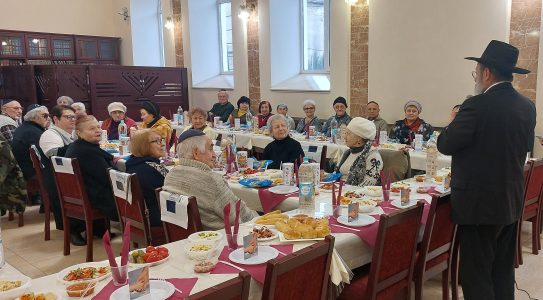
In the midst of the war, we bring the Hanukkah light to the elderly and survivors gathered at the Nikolayev synagogue.
Simcha
Simcha is 97 – and happy about our visit. He has been going to the synagogue every day for many years.
Simcha shows me the Hebrew-Russian book of Psalms that he received as a gift from the synagogue. We help ourselves with the cell phone flashlight and read Psalm 121 together, in both languages.
“I lift up my eyes to the hills… Behold, he who keeps Israel will neither slumber nor sleep.”
Black Sea city in the dark
With every kilometer that we get closer to our beloved and ever so familiar Odessa, we feel more excited. Here we know our way around, here we are a two hours’ drive away from the front line, here we are always welcome.
But the abundant Christmas decorations in front of the restaurants and stores cover up the reality of this third winter of war. Block after block, the city is dark for many hours. I’m glad that I can charge my cell phone with the power bank I brought with me. My new headlamp helps me to sort out the presents for the next day in the dark hotel room.
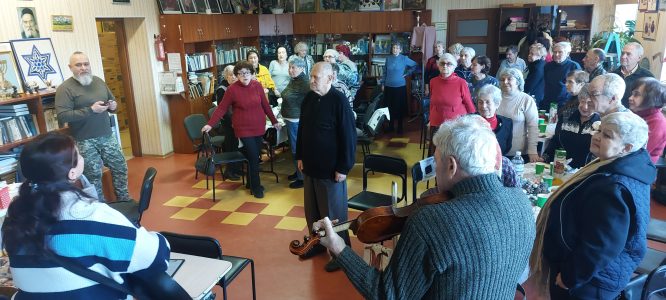
Our guests from the Jewish Community in Odessa are rising for the playing of the National Israeli Anthem.
What to do?
After the third siren at night, I’m sitting at the breakfast table with my colleague Alina, feeling pretty tired and wondering what we should do now. The warning app shows “Air alert: increased danger”. The explosions of the air defense can be heard again and again.
There is only lukewarm instant coffee from the emergency generator in the restaurant cellar, where we are expecting 70 Holocaust survivors and Jewish senior citizens for two happy Hanukkah celebrations in a few hours. All we can do is pray and activate our prayer network.
Two seconds after I send the SOS message to my friends, the cell phone buzzes again: All-clear! The next Hanukkah miracle. It stays quiet all day. God spreads His protective umbrella over us and our guests.
Tumbalalaika, shpil Balalaika
Festively laid tables, shining eyes, dozens of hugs, overwhelmed words of gratitude – the atmosphere is phenomenal, especially on this day. Lena, a dear friend from the Esra fund in Kiev, leads us through the event with music – from Tumbalalaika to Am Israel Chai and the Israeli national anthem. Yakov, one of our supported friends from the Jewish Community, accompanies her on the violin. So many emotions swirl through the air. We are allowed to share a few hours of the lives of our Jewish friends that have become so difficult and incredibly lonely.
Celebrating the day with all our hearts
Svetlana, who had already canceled, has come after all and hardly wants to let us go. An elderly gentleman tells me: “I was here for the first time last year. This year I feel like I’m coming home to a family celebration!” A lady says: “I’ve been to a lot of events, but this is something else. You do this wholeheartedly, with so much love, it’s unique!”
Reveka, whose family is from Lodz and whom I have taken particularly close to my heart, shows me her son on her cell phone, in uniform. “He was badly wounded. Now he needs a ventilator all the time. He went to the front as a volunteer, but apart from a miserable disability pension, he gets nothing else from the army. It’s so sad.” We are sharing her pain. And our dear Inga pulls me aside and says: “This is such a special day for me. I got some bad news at the doctor’s this morning. I don’t know if we’ll see each other again. I’ve decided to celebrate this day with all my heart!”
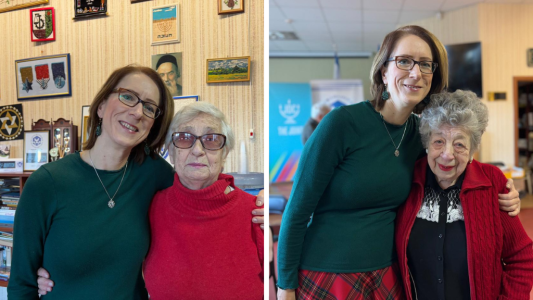
Svetlana (l) and Reveka (r) are so happy they came. The good memories of our gathering will last a long time.
Setting the table for God’s pearls
We have the tables set four times in Odessa – and would love to extend them, because there are still so many lonely Jewish senior citizens that we would love to invite. Odessa still has a large Jewish population, and for the last two years there have also been many refugees from Kherson. We add to the festive decorations on the richly laid table, place a chocolate heart and a card with the words from Isaiah 41 on each seat: “Do not be afraid, I am with you.”
The room fills up even before everything is set. Most of the guests have arrived half an hour early; they have been looking forward to the meeting for so long. Roman Shvartsman, Chairman of the Association of Holocaust Survivors in Greater Odessa, is our key contact. At his behest, 40 guests have come who survived ghettos and concentration camps in the region. We meet a seemingly robust lady who was born in Auschwitz. Arkadi sits at the front and talks in English with our Dutch guests Frank van Oordt, CSI director in the Netherlands, and his brother Roger, honorary Israeli consul there, who have joined us for a series of events. Arkadi testified at the Nuremberg trials and founded the Odessa Holocaust Museum.
The generation that didn’t have a childhood
“We are the generation that didn’t have a childhood,” says Roman. “And to hear now that people in Germany prayed for us every day even back in communist times, and to see how beautifully you receive us here today, that is like balm for our souls!”
On January 29, Roman will be received by Germany’s Federal President on the occasion of the 80th anniversary of the liberation of the Auschwitz concentration camp and will then speak in the Bundestag.
‘You left your comfortable homes behind to be here with us – that means more to us than anything else! It gives us what we need most – hope!’
What is needed most: Hope
Lena’s wonderful music – a mix of Yiddish, Hebrew and Russian – simply makes our dear guests happy. It’s so nice to see them enjoying every minute of our time together. At the end, the room starts dancing.
“There is a lot of help we need here,” says an elderly lady, who fled Kherson with her whole family at the end of 2022. “But the fact that you left your comfortable homes behind to be here with us – that means more to us than anything else! It gives us what we need most – hope!”
Dear supporters: Everything that our team has been able to do to comfort, help and bring healing in Ukraine under very difficult conditions, has been made possible by your support – every single prayer, every single gift. How many miracles we have witnessed this week. But it takes someone to pray them down from heaven. We would like to say THANK YOU from the bottom of our hearts for this precious ministry at the “home front”, during this holiday season! May the blessings of our loving Father, which you are helping to release, flow back abundantly into your family!
